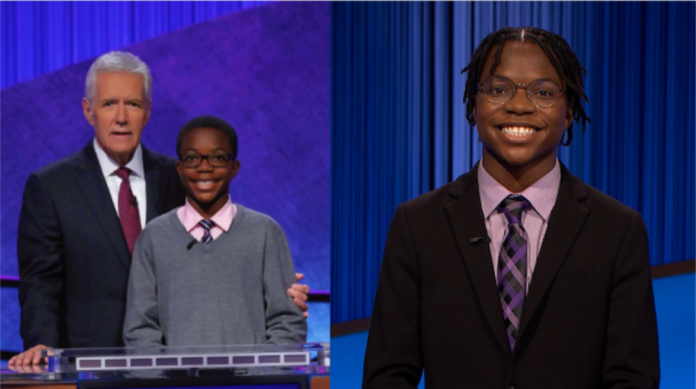
UNC-Chapel Hill sophomore Rotimi Kukoyi recently became the youngest contestant ever in the Jeopardy!‘s “Second Chance” tournament. He originally competed as a freshman in high school back in 2018 and returned to the show for a second time in an episode that aired January 9, 2024. In both appearances, Kukoyi appeared in a light pink shirt and blue tie, but, on the second time on the show, Kuyoki won with a total of $16,001, edging out the second-place contestant by a mere dollar. He eventually finished third in the “Second Chance” tournament.
Kukoyi moved to Alabama in 2019, where his academic achievements led not only to his Jeopardy! debut, but also to over $20 million in scholarships from top universities. He was invited to Jeopardy!’s High School Reunion in March of 2023 but had to drop out after contracting Covid-19. Those working on the show told Kukoyi, “We’ll have you back for something later,” and, nearly a year later, he was back on in the studio to compete.
Was there any specific intention behind wearing the same color shirt and tie? Is it lucky?
I just like the way that color looks on me honestly. No luck, unfortunately. I was like 5’1″ the first time I was on Jeopardy!, and now I’m like 5’8″, so nothing fits me anymore. [It was] just kind of a coincidence.
Besides your own strategy and ability, were there any major differences that you noticed compared to the first time you competed on the show?
I would say the biggest thing was honestly just the difficulty of the questions and the strength of the competitors. The first time I was on the show, I was on the high school version, so it was pretty watered down in terms of difficulty. All of us were still in high school, so we hadn’t completed our education or anything like that. This time around, I knew it would be a lot harder because this was the adult version of the show. Not only that, but it was a special tournament where winners could have an opportunity to advance to the Tournament of Champions, which is the big event for Jeopardy! I knew that everybody was going to be very well prepared—very brilliant, very ready—and I had to be ready to hold my own against that level of competition.
You studied vigorously not only for Jeopardy! but also for finals. What has driven you to seemingly give all of your academic pursuits 100%?
I think honestly, for the most part, studying for Jeopardy! was pretty fun for two reasons. One, just because I love the show; it’s something my family’s always watched, so the opportunity to make myself a better Jeopardy! player by going through old Jeopardy! questions and researching that was honestly pretty fun. It can be stressful at times, but it was definitely more fun than studying for my organic chemistry test. It was still a game—it’s a game show at the end of the day. The other reason was that studying for Jeopardy! is useful in the sense that it’s not only studying for the show, but it also makes you a more well-rounded person. For the first time in my life, I really properly independently studied art and architecture, who discovered what in science, and ancient civilizations. That’s not necessarily stuff that I’m learning being a public health, biology, and chemistry student. It was just interesting to learn more about the world and be able to engage in more meaningful discussions with people outside of my specific interests and career focus.
You had a number of schools to choose from due to your academic abilities. As someone who has grown up in Chapel Hill, I guess I have to ask: what was so compelling about UNC-Chapel Hill?
I didn’t really know I wanted to come to UNC until the deadline. I didn’t have a dream school really. When I was in high school, I felt like I would just know when the time came. I think people idealize one location over another, but you can get surprised your senior year, so I decided to leave myself open. I didn’t do early decision anywhere. I wanted to keep the doors open and apply for some scholarships and cool programs.
UNC-Chapel Hill stood out for a couple of reasons compared to other choices that might have been better well known or more prestigious. One thing with UNC was that I was offered the Morehead-Cain scholarship, which was a huge distinction, in the sense where—although I did get full rides from other universities or very strong scholarship program offers—I think the Morehead program is unique. It’s very individualized in the support it offers students. You pretty much get to design your summers fully funded, and you have access to a lot of opportunities on campus, along with alumni resources. That’s something that has continued to pay dividends for me every single day in a way that it wouldn’t have at any other school. UNC also has a very strong undergraduate public health program that is very practical. Stanford didn’t have a public health major at the time I was looking at it. Schools like Harvard and Yale did have undergraduate public health programs, but they were a little bit more informal.
UNC is a school where students can be smart and have success but also have fun. It’s very sad when I go to visit my friends at some of the Ivy League schools. It’s like there’s no campus culture; a lot of the students have never even been to any of their school sports games. They go to the Harvard and Yale game, and half the people there don’t know how it works and nobody cares who wins or loses. I’m saying this as an outsider, but it feels mildly pretentious, like the rivalry, arguing which school is better when half the kids are rich legacies.
With UNC and Duke, it’s more like a culture game, and, when we win, we rush Franklin and people have fun here. All of those factors kind of combined together— being able to have a better balance of social and academic life, along with the Morehead program and the public health program at UNC—really made it stand out.
How has growing up in Alabama as a Nigerian-American shaped your life and ultimately your academic pursuits?
I grew up kind of all over the place; I grew up in four different states, Alabama being the last one. I lived in Iowa for my early childhood, then California, South Carolina, and finally we settled in Alabama. I’d say the Nigerian part has influenced me less so than the Black part, just in the sense that a lot of my professional goals stem from promoting more equitable health outcomes, particularly through the lens of race. Unfortunately, your skin color dictates a lot of your health measures and even your life expectancy by multiple years. That’s something that I and every black American has to cope with. If I’m going to hope to bring kids of my own into this world, that’s an issue that I don’t want to leave unsolved for them.
If you don’t mind sharing, do you have any current plans for your winnings?
Most of that money is going to investments for my future, retirement, social security, but—outside of that—I think it’s important to spend money on things that you can really only do and enjoy when you’re young, so, at the moment, I’m going to go to Montreal for spring break and saving up for a big international trip after I graduate college.











